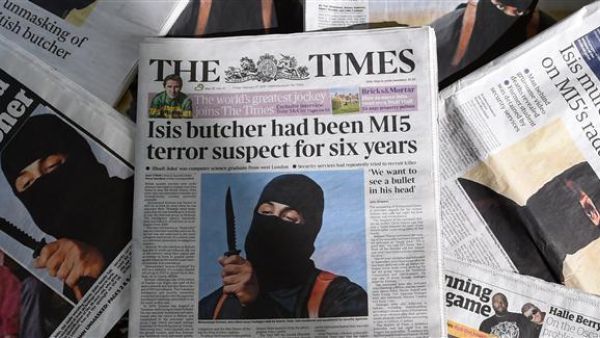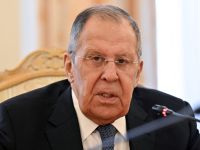By Eleanor Beevor
This is Part III of a three part series exploring ISIS returnees in Belgium, France and the United Kingdom.
The words “The Beatles” have been splashed across the UK’s headlines for the past few days. But it is for a discomforting reason that has nothing to do with the British music legends.
The Beatles in question were a four-man group of young British men who travelled to Syria to join ISIS. And while 800 UK citizens left to join the terrorist group, none of the others received anything like the attention that this quartet did.
The Beatles were the group that oversaw the killings of western hostages in ISIS’s propaganda videos. Two American journalists – Steven Sotloff and James Foley, American aid worker Peter Kassig, and British aid workers Alan Henning and David Haines – were beheaded in the grim snuff films. The group are believed to have been responsible for the deaths of twenty-seven hostages in total.
Now the Beatles are all out of the action. But their members were removed from the battlefield in different ways. And in each case, Britain’s response has been determined by circumstance, rather than by any fixed policy. But while a degree of adaptation is always necessary, British counter-terrorism policy seems to be increasingly held hostage to the political mood. And this can make for risky repercussions.
The public debate over how to respond to the ISIS threat has been open and lively. But in an increasingly divided political climate, it is proving impossible to create a terrorism policy that will satisfy both sides of a gulf in British public opinion. And this is exacerbating a fear that many Britons already have – that their government is much too willing to abandon policies it has otherwise held dear when it comes to dealing with terrorists.
The Beatles’ most famous member was unquestionably the balaclava-clad executioner “Jihadi John”, who waved a knife at the screen whilst accusing Britain of crimes against Islam, before he beheaded the hostages on camera. Jihadi John’s real name was Mohammed Emwazi, and his journey to radicalisation was a confusing one.
Though British security services were tracking him by the time he left university in 2009, none of his school or university peers appear to have noticed him showing radical sympathies. Yet by the time he reached Syria in 2013, he was ready to embrace his horrific new role as ISIS’s executioner and poster boy. He was accordingly placed on a British intelligence “kill list”, and died in a coordinated British-American drone strike in Raqqa in November 2015.
That Britain uses drone operations to kill suspected terrorists abroad is hardly a secret, though not one that the government indulges discussion of where possible. Its drone operations are normally kept very quiet. But in the cases of the deaths of British ISIS fighters, the government made exceptions. Prime Minister David Cameron gave a televised statement announcing Emwazi’s death, saying that the strike was “…an act of self-defence. It was the right thing to do.”
Much of the media coverage greeting the announcement was positive. However, other commentators were more critical. Labour Party leader Jeremy Corbyn said that Emwazi should have been captured alive and made to face trial in the UK. Other commentators questioned the legality of the drone strike. And some said that this highly publicized death, a “martyrdom”, was exactly what Emwazi would have wanted.
There was also concern that the criteria justifying drone strikes seemed to be shifting. Two months earlier, the drone strike deaths of another pair of British jihadists – Reyaad Khan and Ruhul Amin – were announced. But in that case, the strike had been justified by the fact that intelligence services believed they could be an “immediate threat” to the UK. Such a justification was not made for Emwazi’s death, raising concerns that policy was shifting according to the profile of the terrorist in question.
The second “Beatle” was a less complicated affair. Aine Davis, a former drug dealer from London who appeared to have been radicalized during a prison spell for weapon possession, reached Syria in 2012. He and Emwazi once prayed at the same mosque. Davis was captured in Turkey in 2015, and arrested on suspicion of plotting terrorist attacks in Istanbul. Turkish courts convicted him of terrorism and sentenced him to seven and a half years in prison.
What will happen to him after his sentence, however, is increasingly unclear given the developments around the last two “Beatles”. In January, Londoners Alexanda Kotey and El Shafee Elsheikh were finally caught by a U.S. backed Kurdish militia in Syria. And it is no doubt a huge relief for the families of the Beatles’ victims that none of the group will be able to brutalize captives any more. But these final two captives have mired Britain in its biggest foreign-fighter controversy yet.
Washington has made clear that it wishes to try Kotey and Elsheikh in America for their part in the killing of American hostages, and Britain has accepted. But it was revealed on July 30th that the UK Home Secretary Sajid Javid had written to US Attorney General Jeff Sessions, assuring him that the UK would not be seeking assurances that the pair would avoid the death penalty. This is a radical change in Britain’s otherwise firm opposition to the death penalty. It has previously refused to extradite individuals to countries where they may risk capital punishment. Nor did Javid appear to seek assurances that the two would not be detained at the notorious Guantanamo Bay prison.

El Shafee Elsheikh (left) and Alexanda Kotey are alleged to have been part of an Isis murder squad nicknamed ‘the Beatles’ by captives (AFP)
The picture is further complicated by the fact that Britain last year revoked the British citizenship of both Kotey and Elsheikh, along with that of many other foreign fighters. Whilst revoking citizenship from terror suspects to prevent them returning to the UK is a practice with precedent, it is technically illegal to do this if the individual would then be rendered stateless.
That is, the policy is only meant to be applicable to dual-citizens, which Kotey and Elsheikh were not. Both of these steps have been described as illegal under British law, with one legal expert quoted as saying: “Javid’s bad legal advice is ‘Just don’t ask.’” Presumably, Aine Davis’s citizenship was also revoked, which raises questions about what will happen to him after his seven years in Turkish prison.
Tracing the Beatles’ respective fates reveals a British policy towards its foreign fighters that is very much in flux. But it also shows a growing willingness to play fast and loose with the law for the purpose of being tough on terror, at least among a proportion of government ministers. The resulting disagreements are not entirely partisan – Javid’s fellow Conservative MP Anna Soubry rebuked his decision, saying: “We cannot pick and choose when to apply a principle as fundamental as opposition to the death penalty.”
But terrorism legislation is one of numerous issues that has fallen into a growing gulf in British public opinion, particularly in the aftermath of the Brexit vote to leave the European Union. The populist wave that led to the narrow victory of the Leave vote was driven, to a large extent, by a negative view of immigration. Fears of Islamist radicalisation and terrorism in Britain always accompanied these immigration debates. And some figures zoomed in on a controversial object of blame.
Prominent Leave campaigners such as Nigel Farage jumped on the issue, and began to describe British and European human rights law as a farcical form of justice, and as a security threat, because of how it mitigated the treatment of terror suspects. And now, discussion in favour of flouting human rights law is growing.
Last week, a prominent Conservative commentator published an article in The Telegraph titled “Britain cannot serve justice to returning jihadists until we tear up our human rights laws”. Former Foreign Secretary Boris Johnson also wrote in The Spectator this week to defend the unconditional extradition. He said that had it been possible to kill Kotey and Elsheikh extrajudicially by drone strike in Syria - “Too damn right we would have”.
There is no shortage of public anger in response to this stance, particularly on the political left. But the problem for the left lies in trying to sell alternatives to this hardline stance. And it is low on options. A different track could try and push rehabilitation and de-radicalisation programs. Both Conservative and Labour governments were certainly willing, for a time, to support experimental de-radicalisation schemes, as well as broader Countering Violent Extremism (CVE) measures.
However, these have proven very contentious among several sectors of the British population. For many on the right, CVE programs are seen as a “soft” response to terrorist offences. Max Hill, the Independent Reviewer for the UK’s Counter-Terrorism legislation was branded a “snowflake” for suggesting that some British citizens who had travelled to Syria needed rehabilitating rather than prosecuting.
Meanwhile, many British Muslims felt stigmatized and even threatened by the controversial Prevent arm of the government’s counter-terrorism strategy. The aim of the program was to stop radicalisation in its tracks before an individual committed an act of terrorism. However, the Prevent “brand” became frequently described as “toxic”. An Open Society research project found that Prevent had become counter-productive, that it was flawed in both design and implementation, and had had the net resulting of eroding British Muslims' trust in authorities.
Prevent has its defenders, who argued that much of its work is little different to social care programs for vulnerable people. They say that it has saved the futures of many young people who would otherwise have taken huge risks due to extremist ideologies - far-right as well as Islamist ones. Nevertheless, Prevent’s reputation as discriminatory towards Muslims has proven impossible to shake off. And its debacles led to many on the political left feeling extremely hesitant about pushing CVE as a core solution.

Memorial to the victims of the suicide bombing in Manchester, 2017 (AFP)
There is a further problem with trying to sell a nervous public de-radicalisation and CVE schemes as a primary defence. This is that the effectiveness of these programs is exceedingly hard to measure. Raffaello Panatucci, Director of International Security Studies at the Royal United Services Institute in London, told Al Bawaba:
“The dilemma with those who work in the de-radicalisation space is proving that they are able to show some success with their programmes. Were those programmes better able to show success consistently, then they would be a more obvious answer. At the moment, in many cases, it is not clear that the programme was able to deliver success, and it is not always clear that individuals de-radicalise, so much as grow up, change their own minds or disengage. The link to the programme can be difficult to show.
I think this illustrates a slight exhaustion in the field where people begin to lose interest in the question given how intractable the problems can seem. This then means you end up with Tory politicians and leaders openly saying things like we should kill them in Syria, or we should waive human rights issues and let them be tried and executed in the US, in contrast to longstanding UK policy. This generates some response in the political space by those on the other end of the spectrum. But the discussion is never about the programmes themselves, but rather a political dispute.”
A defence of existing legal procedures has been the fallback for all those opposed to abandoning human rights cornerstones when dealing with terrorism. But public opinion will be measuring the loathsomeness of the Beatles against the importance of Britain credibly defending human rights abroad. And it is far from clear that the latter would win, particularly if efforts to rebrand human rights as an obstacle to justice continue.
In the face of recent experience, this is hardly surprising. A number of horrifying terrorist attacks in Britain over the last two years have intensified a desire to crack down on perpetrators. In March 2017, a 52-year old man killed five people and injured over fifty by ramming a car into pedestrians on Westminster Bridge.
He then stabled a police officer to death outside the Palace of Westminster, before being shot by another police officer. Two months later, eight people were killed and forty-eight injured in a mass stabbing attack and a hit-and-run. Both attacks were claimed by ISIS media outlets. And the horrifying bombing of a pop concert in Manchester shook the nation in May 2017, in which 22 people many of them children - died.
That Britons wish to see terrorists punished to the limits of the law and beyond in response to these atrocities is understandable. But terrorist propaganda will exploit every occasion in which Britain abandons the values it claims to stand for. There is no easy answer to the terrorism problem. But the harshest response is rarely the same as the cleverest one.
The views expressed in this article do not necessarily reflect those of Al Bawaba News. Part I and Part II.







